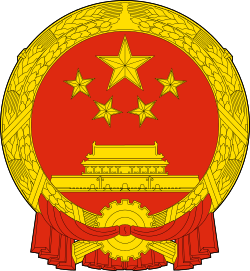China–Sudan relations
 |
|
Sudan |
China |
|---|---|
People's Republic of China–Sudan relations refers to the bilateral relations between the People's Republic of China and Sudan. China is Sudan's biggest trade partner, importing oil from Sudan while exporting low cost items as well as armaments to Sudan. China and Sudan enjoy a very robust and productive relationship in the fields of diplomacy, economic trade, and political strategism. The two nation-states established diplomatic relations on January 4, 1959 and have since become strongly close global allies.
Darfur issue
Human rights organizations have criticized China for its supportive relationship with the government of Sudan, which they accuse of arming militias in the tribal War in Darfur.[1][2] China is Sudan's largest economic partner, with a 40% share in Sudanese oil projects.[3] China also sold Sudan small arms,[4] but since 2005 the United Nations has imposed an arms embargo on the Sudanese government because of the War in Darfur. In July 2008, a BBC news report claimed to have found evidence of China–Sudan trade in violation of the report.[5] SIPRI reports that only 8 percent of Sudanese arms are Chinese, and that Russian arms actually make up the majority, at 87 percent. Russia is the major weapons supplier to Sudan.[6]
Sudanese President Omar al-Bashir has sought the assistance of numerous non-Western countries after the West, led by America, imposed sanctions against him. He said:
From the first day, our policy was clear: To look eastward, toward China, Malaysia, India, Indonesia, Russia, and even Korea and Japan, even if the Western influence upon some [of these] countries is strong. We believe that the Chinese expansion was natural because it filled the space left by Western governments, the United States, and international funding agencies. The success of the Sudanese experiment in dealing with China without political conditions or pressures encouraged other African countries to look toward China.[7]
Non-interference
Southern Sudanese hip-hop star Emmanuel Jal noted that China was seen positively by Sudanese and Africans due to its non-interference policy, only doing business:
The Chinese don't influence our politics, They don't comment on it, and what they want, they pay for -- sometimes double the amount. This tends to make all Africans happy -- from the dictators to the democrats, There isn't a party in Africa that doesn't like them. Even if you're a rebel movement and you say to them you can secure gold, the Chinese will simply say they want to buy it. The only foreign policy advice I heard from China was when they said to Sudan, "Don't go back to war." That's all they said. They didn't push anything else. However many other countries are angered by China's non interference policies because their aid of arms to the Sudanese government has provided them with the means to kill millions of innocent civilians.[8]
Trade
Trade between the two countries was worth US$8.6 billion in 2010.[9]
Chinese development finance to Sudan
From 2000 to 2011, there are approximately 65 Chinese official development finance projects identified in Sudan through various media reports.[10] These projects include helping construct the railway from Khartoum to Port Sudan,[11] $519 million USD loan for the hydro-mechanical components of the 1,250 MW Merowe hydroelectric dam,[12] and the construction of a 500 MV coal fired power plant in Port Sudan and a 320 MV gas fired power plant in Rabak at the cost of 512 million USD by the Shandong Electric Power Construction Corporation in 2005.[13]
See also
- Africa–China relations
- Africa–China economic relations
- China-Africa Development Fund
- Forum on China–Africa Cooperation
Bibliography
- Cardenal, Juan Pablo; Araújo, Heriberto (2011). La silenciosa conquista china (in Spanish). Barcelona: Crítica. pp. 136–140; 159–170.
References
- ↑ Foreign Policy: Why China Won’t Save Darfur
- ↑ Foreign Affairs - Beyond Darfur - Andrew S. Natsios Archived December 18, 2008, at the Wayback Machine.
- ↑ http://www.amnestyusa.org/Business_and_Human_Rights/The_Big_4/page.do?id=1081006&n1=3&n2=26
- ↑ Oil for China, Guns for Darfur Archived April 5, 2008, at the Wayback Machine.
- ↑ "China 'is fuelling war in Darfur'". BBC News. 2008-07-13. Retrieved 2010-05-22.
- ↑ Andrew McGregor (February 12, 2009). "Russia's Arms Sales to Sudan a First Step in Return to Africa: Part Two". Eurasia Daily Monitor Volume: 6 Issue: 29. Retrieved January 30, 2011.
- ↑ SAM DEALEY (Aug 14, 2009). "Omar al-Bashir Q&A: 'In Any War, Mistakes Happen on the Ground'". TIME. Retrieved March 9, 2011.
- ↑ Peter Shadbolt (February 4, 2011). "China, hip-hop and the new Sudan". CNN. Retrieved March 9, 2011.
- ↑ "China pledges $20bn in credit for Africa at summit". BBC News Online. BBC. 2012-07-19. Retrieved 2012-07-19.
- ↑ Austin Strange, Bradley C. Parks, Michael J. Tierney, Andreas Fuchs, Axel Dreher, and Vijaya Ramachandran. 2013. China’s Development Finance to Africa: A Media-Based Approach to Data Collection. CGD Working Paper 323. Washington DC: Center for Global Development.http://china.aiddata.org
- ↑ Strange, Parks, Tierney, Fuchs, Dreher, and Ramachandran, China’s Development Finance to Africa: A Media-Based Approach to Data Collection.http://aiddatachina.org/projects/207
- ↑ Strange, Parks, Tierney, Fuchs, Dreher, and Ramachandran, China’s Development Finance to Africa: A Media-Based Approach to Data Collection.http://aiddatachina.org/projects/178
- ↑ Strange, Parks, Tierney, Fuchs, Dreher, and Ramachandran, China’s Development Finance to Africa: A Media-Based Approach to Data Collection.http://aiddatachina.org/projects/182
